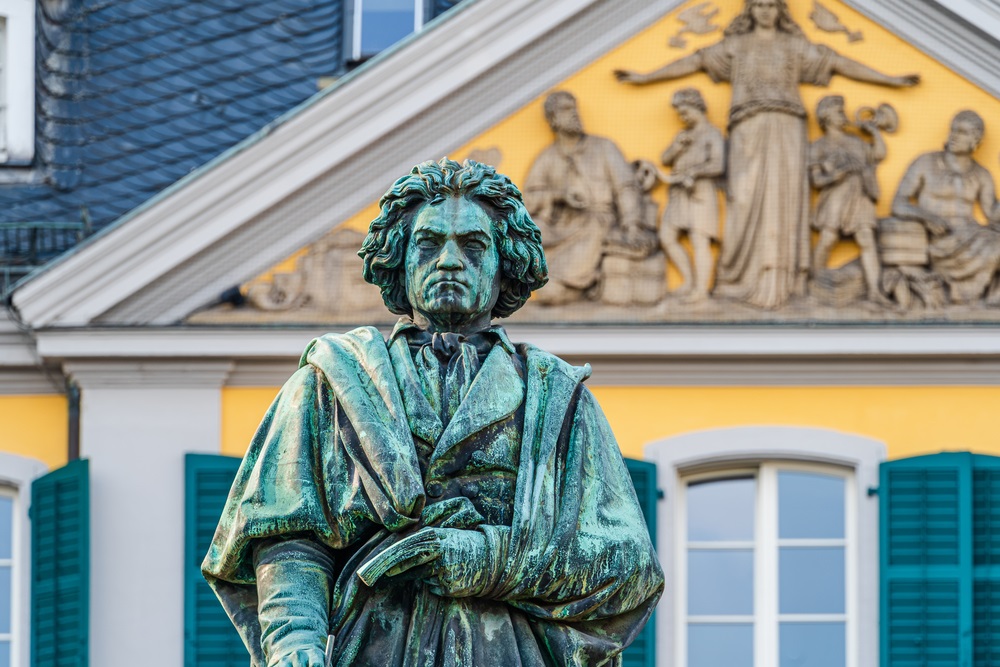
When it comes to accurately measuring the impact Ludwig van Beethoven had on the musical world, numerous academic tomes deal with this in an appropriate level of detail. In a nutshell, Beethoven’s contribution to the development of classical music was simply monumental. His Ninth Symphony could be seen as the crowning glory of this lifetime of creative achievement.
What is it about the Ninth Symphony that has singled it out as one of the most important pieces of music ever composed? If you have been fortunate enough to attend the premiere of the work you might not have left with the impression that it would have a lasting impact on the world. Some critics favourably reviewed the symphony whereas others were less impressed.
Some of the reservations came about as a result of the sheer scale of the work, notably the monumental finale. Also, the complexities and sophistication of Beethoven’s composition went above the heads of many who could not fathom what the great man was trying to convey.
Beethoven’s Ninth Symphony Impact on Classical Music
Even though the symphony followed the traditional four-movement structure and opening in a minor key and gloriously concluding in the major, the work was intricate. I have always viewed Beethoven as a musical economist. By that I mean he rarely wastes any material he has composed.
Relationships between themes, harmony and his highly developed structures interlink, get reworked, developed and renewed in ways that Beethoven had perfected during years of hard work.
The coherence that this brings to Beethoven’s compositions is undeniable, but this throws a curved ball into the Ninth Symphony that was challenging for many people. Some heard the symphony as chaotic, unable to grasp the complexities of Beethoven’s music.
Schiller’s Ode To Joy
Where Beethoven was undeniably smart was in including voices in the finale of this symphony. He knew this would win favour with his Viennese audience who adored choral music and opera and it worked.
Beethoven’s choice to set Schiller’s Ode To Joy (1785), was also a masterstroke. Schiller’s message echoed Beethoven’s feelings about humanity and brought the immense symphony to a triumphant and hopeful conclusion.
It is perhaps this earnest sentiment expressed by Beethoven, as Schiller, that resonates still today and has made such a lasting impression on everyone who hears the symphony. The humanist ideals that thread through the symphony seem particularly important today as they were in the 19th century.
It is worth remembering that structurally, Beethoven stretches conventional forms to their limits. The finale is longer than any other single movement. It presents a certain imbalance and points to the suggestion that Beethoven was considering creating two symphonies from this single ninth. You can understand that thinking.
Instead, what Beethoven did was pour all the glory, joy and ecstatic optimism into the last movement of the last symphony he’d ever complete. How else could Beethoven have possibly conveyed his deepest and most earnest belief in another way?
There’s much more to the Ninth Symphony
Part of the confusion that this monumental work generates is because of its hidden depths that are the breeding ground for diverse interpretations.
Consider the opening movement. You could hear this in multiple ways. The cold desolation that seems to permeate this movement is unsettling, even chaotic. For many this opening scene is a cosmic one, drawing our attention to how insignificant we are when compared to the expanse of the universe.
If we accept this bleakness then we can also hear the contrasting elements that follow later in the symphony when Beethoven returns to remind us of our collective humanity and potential for redemption. This opening movement is in some ways a glance over the shoulder towards the Eroica Symphony.
Hope For Humanity
As this symphony was the last Beethoven completed, the hero has changed; altered by life’s experience, and finally laid to rest. Maybe this is also the farewell to the repressive Napoleonic regime under which Beethoven was forced to live and work. Remember how Beethoven supposedly scratched out the dedication on the Eroica. The fall from grace of the national hero began here.
It has been suggested that Beethoven places humanity itself at the heart of the piece. Humanity could be seen as the hero capable now, of overcoming its struggles without the need for dictators and demons. This symphony seems to be a journey to and from the vast darkness of space and human life on Earth.
Beethoven seems to be conveying his deep understanding of man’s place in the universe but not as many might say, its futility. Instead, Beethoven appears to be telling us that hope and truth lie within us all.
The joy we can feel is a collective one if humanity can unite under the same banner. In this way alone it makes sense to recognise the universal appeal and resonance the symphony has and continues to have with countless numbers of listeners.
During Europe’s turmoil
When Beethoven was composing this symphony (1822-1824), Europe continued to be in turmoil. Many of the long-standing institutions and systems were disintegrating. There must have been a feeling of impending doom and disaster. What hope was there for humanity that stood so close to the edge of destruction?
Beethoven was by this time deaf, short of sight and in almost constant pain, yet he managed with one final effort to bring a message of hope to the world. If ever there was a testament to the humanity of Beethoven, this must surely be it.
My Verdict
On a purely academic level, there is enough within the bars of this great symphony to keep musicologists debating, scrutinising and scribbling about for many years to come. But, the symphony, as I’ve tried to illustrate, is far greater than the sum of its parts.
The compositional mastery can almost be taken as read, but the intricate and sophisticated messages that come through this musical voyage are far more valuable. Beethoven would perhaps have been extremely disheartened to see the world in which we live now.
What may provide him with some glimmer of comfort is how successfully his message has been received and along with it the living belief in a better world for all.

